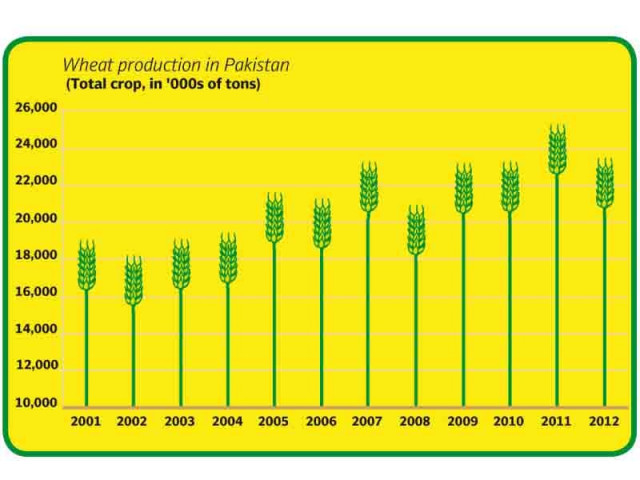Land and bread: Despite support price, wheat farmers struggle financially
Middlemen take advantage of the government’s programmes, leaving farmers stranded.

Land and bread: Despite support price, wheat farmers struggle financially
The government’s intervention both in terms of price and quantity is highest in the market for Pakistan’s wheat crop, the eighth largest in the world. Somewhat unsurprisingly, it is also the crop for which farmers have the most complaints.
The problem starts with the government’s attempts to ensure that Pakistan is self-sufficient in wheat. Every year, the government declares a “support price”, which is meant to ensure that farmers always receive a price that is above their cost of production and cost of capital. This support price is enforced through a massive buying effort coordinated between the federal and provincial government agencies.
The federally owned Pakistan Agricultural Storage and Supplies Corporation, as well as the provincial food departments, announce buying targets – which often account for as much as a quarter of the total wheat crop – at the specified support price. The government’s hope is that by buying such a large volume at a specific price, it will set the market price, thus ensuring that farmers get what the government deems to be adequate compensation for their crop.
But despite its best intentions, the government has been unable to ensure that the farmers actually get the announced price. The mechanism adopted by the government is the use of gunny bags, which are supposed to be distributed for free to farmers. The farmers are then supposed to fill the bags with their wheat crop, with each bag carrying 40 kilograms of wheat, and then collect the government’s announced support price from either Passco or the provincial food department.
For fiscal 2012, the government had announced a support price of Rs1,050 per 40-kilogrammes. But most farmers in Punjab reported receiving only between Rs875 and Rs925 per 40-kilogrammes, largely due to the fact that middlemen often bribe Passco and food department officials and buy the bags, usually at around Rs50 per 40-kilogramme bag.
“Whatever stock of wheat bags is available, it is distributed either to influential landowners or supplied after charging extra money illegally,” said Arshad Ahmad, a Faisalabad-based wheat-grower.
The farmers are then forced to sell their crop at the lower prices to these middlemen who own the gunny bags. The middlemen pocket a net profit of between Rs100 and Rs150 per bag.
This manipulation of the government system drives down the overall market price of wheat, and affects even those farmers who are not selling their crop to the government.
Another significant source of the problem for farmers is their inability to store their own crop, since most of them do not own or have access to storage facilities. Wholesale purchasers are waiting in the wings for such an opportunity to arise. They know that farmers cannot wait indefinitely due to climatic uncertainties, as well as a lack of storage facilities. Moreover, they need cash to pay debts taken on to finance their inputs, and also to prepare for sowing the next crop, Ahmad added.
This lack of storage facilities has another consequence: many agricultural experts estimate that close to 30% of the wheat crop is rendered unusable owing to poor harvesting techniques and inadequate post-harvest storage facilities. The government owns massive storage facilities, but it does not provide access to them to farmers. For their part, flour mill owners say that the government often does not sell the crop to them on time, and maintains large reserves that often go to waste in government stores.
The degree to which the government’s benefits help farmers also depends on the size of each farmer’s landholding. “The vast majority of government benefits for farmers only flow to large landholders,” said Kashir Mahmood, an agricultural expert.
For instance, the Punjab government is supposed to provide genetically modified wheat seeds to farmers to help improve their yields, but experts estimate that only about 20% of farmers have access to such seeds.
Published in The Express Tribune, December 10th, 2012.



















COMMENTS
Comments are moderated and generally will be posted if they are on-topic and not abusive.
For more information, please see our Comments FAQ